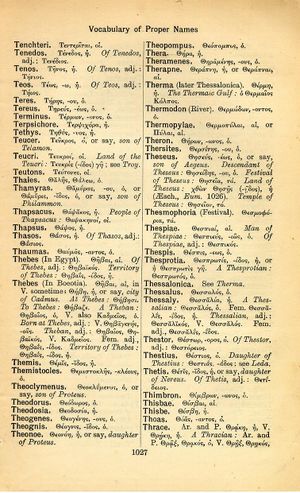Thersites
Ὥσπερ αὐτοῦ τοῦ ἡλίου μὴ ὄντος καυστικοῦ, ἀλλ' οὔσης ζωτικῆς καὶ ζωοποιοῦ θέρμης ἐν αὐτῷ καὶ ἀπλήκτου, ὁ ἀὴρ παθητικῶς δέχεται τὸ ἀπ' αὐτοῦ ϕῶς καὶ καυστικῶς· οὕτως οὖν ἁρμονίας οὔσης ἐν αὐτοῖς τινὸς καὶ ἑτέρου εἴδους ϕωνῆς ἡμεῖς παθητικῶς ἀκούομεν → Just as although the Sun itself does not cause burning but has a heat in it that is life-giving, life-engendering, and mild, the air receives light from it by being affected and burned, so also although there is a certain harmony and a different kind of voice in them, we hear it by being affected.
English > Greek (Woodhouse)
Θερσίτης, -ου, ὁ.
Latin > English (Lewis & Short)
Thersītes: ae, m., = Θερσίτης,>
I a Greek before Troy, famous for his ugliness and scurrility, Ov. M. 13, 233; id. P. 3, 9, 10; Juv. 11, 31.—Hence, a contemptible person, Juv. 8, 269; and for a calumniator, reviler, Sen. Ira, 3, 23, 3.
Latin > French (Gaffiot 2016)
Thersītēs,¹³ æ, m. (Θερσίτης), Thersite [célèbre par sa difformité et par sa mauvaise langue] : Ov. M. 13, 233 ; Juv. 11, 31 || = homme très laid : Juv. 8, 269 || = une mauvaise langue : Sen. Ira 3, 23, 2 ; Amm. 30, 4, 15.

